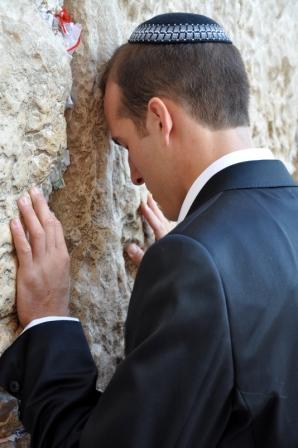“Baruch Dayan HaEmet – blessed are You, the true judge.”
Today is my grandmother’s funeral. Later, I will need to say to my father, grandfather, and uncle who will sit shiva:
“Hamokom Yenachem … May ‘The Place’ – the Omnipresent – comfort (console) you among the other mourners of Tzion (Zion) and Yerusholayim.”
Today is also Yom Ha’atzmaut, which celebrates 63 years of Israel’s independence. I am happy for Israel and us as a Jewish people that we have the safety of our land, yet still today is a sad day for me. As happy as it is for those who celebrate Israel, we are still in exile. Even the people in Israel on the Jewish festivals say in their prayers; “because of our sins we have been exiled from our land.”
I will console the mourners by offering them consolation amongst all the mourners of Tzion and Yerusholayim. What is the connection and why should this bring them comfort?
Mentioning Israel brings the mourners comfort. Even after mourning for 2,000 years, we the Jewish people have never lost hope. We believe that we will one day return to the glory of Jerusalem. With this will come the resurrection of the dead, as our prophets have promised that the dead will come back to life in the Messianic era. This brings comfort, that as painful as it is now, it is only temporary.
Further, The Romans may have destroyed the buildings of Jerusalem, but they could never touch its Jewish spirit and inner holiness. None of our enemies can ever touch the spirit of Jerusalem. So to, the passing of a loved one will stay with us in spirit. We may no longer see them, yet we can still sense their presence. This brings some comfort to know that we are never truly apart.
Grandma, you are greatly missed by your children, grandchildren, great-grandchildren, extended family, and friends. Your love for us is eternal, and we will carry it always. Please G-d may the almighty bring the Moshiach speedily in our days and may we celebrate with you in Jerusalem. May this day of Yom Ha’atzmaut become a day the entire world will rejoice.
3 Responses to “What to Say to a Jewish Mourner on Yom Ha’atzmaut?”







Great post – I’m so sorry to hear about your loss Ben. Praying for you.
I didn’t know that the Jewish people living in the land prayed: “because of our sins we have been exiled from our land.” Do you think they will continue to pray that way even once the temple gets rebuilt (assuming its rebuilt before the Messianic era)?
If the temple where rebuild, than it would be the messianic era and we’d no longer say the part in prayer.
Today, a friend of mine who lost her grandmother contacted me and asked for some spiritual guidance and words of comfort. Here is what I shared with her:
“The truth is, when it comes to loss and grief, all people tend to be on the same level, spiritual or not. Spirituality helps bring understanding, but the level and depth of pain is the same. The true key to healing is time and acceptance. In Jewish tradition, mourners have a series of mourning practices that are very practical for healing and may give you some ideas on things you can do. The first step, which is 7 days, is an intense period of mourning. A mourner is not expected to go to work, to get dressed, even to take a shower. A mourner is expected even to be so grief-stricken as to sit on the floor. This initial stage embraces the pain of the loss and accepts it as normal and healthy. Don’t be afraid to cry, don’t be afraid to talk to your close friends and family about the person you loved and lost, on your own terms. But after the 7 days are up, the mourner is expected to get up and resume a somewhat more normal life, although certain aspects of the mourning remain during the first month, and others during the first year. In this way you give yourself time to heal, slowly, but also force yourself to move on – you cannot grieve forever because you also have a life you must live, you only get one, and your grandma would not want to see you unhappy for so long. The grieving process is different for each individual, so you have to find what exactly it is that you need, but the most important first step is to accept that pain and let yourself feel it and experience it and know that it is OK and normal and healthy.
“In terms of acceptance, there are a lot of “spiritual” things I could say, but in the end although they are all true and deep and meaningful they can come off sounding like nothing more than platitudes. The fact is, that although you can no longer see your grandma, she is still here, in a spiritual sense, and you can still sense her presence. In a thin, still moment, in peacefulness, and in meditation, you can be conscious of her.”
I hope this helps my friend and, if you are a mourner, I hope it helps you as well.